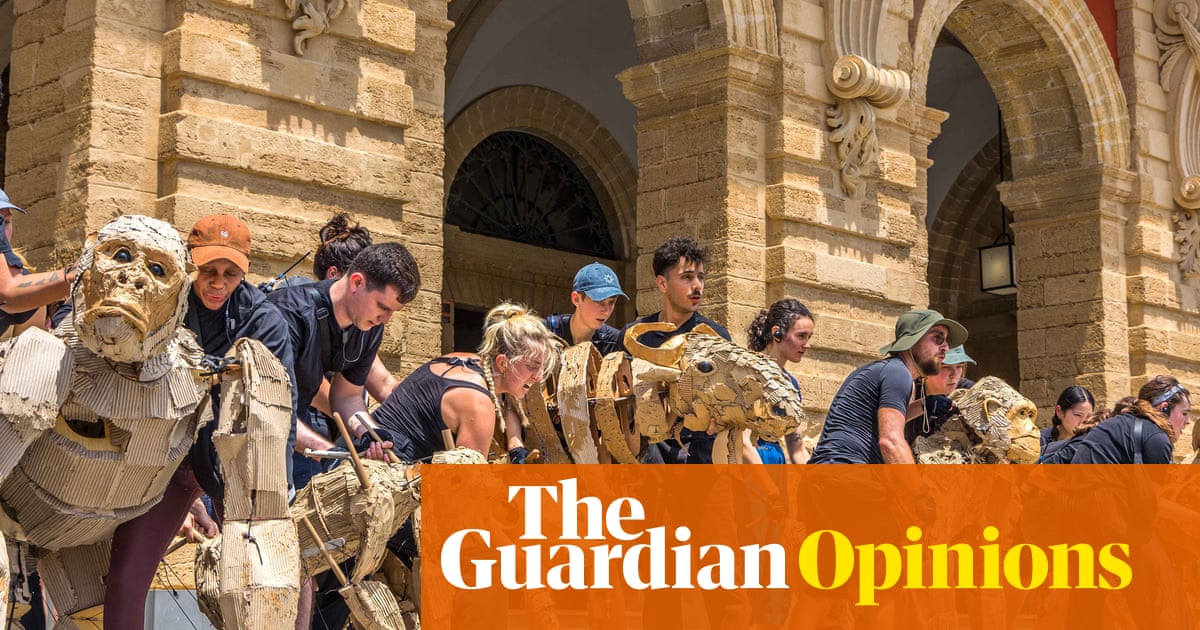As parts of the UK swelter, this week brought yet more alarming reports ofincreasing temperatures, extremeweather eventsanddwindling chancesof meeting the global 1.5C target. It was the UK’s warmest springon recordand its driest in more than 50 years.
Communicating the urgency of our predicament without provoking despair and hopelessness is an intractable challenge, especially when it comes to children. But two trail-blazing theatre experiences are bringing the breakdown of the natural world into urban metropolises, and raising the alarm with such immediacy that even those of us fortunate enough to live in places that have so far been relatively unaffected by the climate crisis must pay attention.
Our Story WithDavid Attenboroughis a breathtaking 50-minute immersive history of the planet, from the team behind the recent filmOcean. Thanks to 24 projectors and 50 speakers, the Natural History Museum’s Jerwood Gallery is transformed into the solar system, prehistoric caves, the ocean and the jungle. As in Maurice Sendak’s children’s classic Where the Wild Things Are, “the walls [become] the world all around”. We swim with whales and come face to face with gorillas – as Sir David did in Life on Earth in 1979. We look from space: like last year’s Booker prize-winning novel,Orbital, by Samantha Harvey, Our Story inspires the feelings of awe and protectiveness towards our planet that astronauts call “the overview effect”.
In the past, Sir David has beenaccusedof not speaking out strongly enough on human-made ecological disaster. But the Guardian writer George Monbiot, once one of his fiercestcritics, described Ocean, released forSir David’s 99th birthdaythis year, as the film“I’ve been waiting for all my working life”. In Our Story, we journey through mass extinctions of the past and, speculatively, in the future. Without change, “the prospect for the generations that follow is grim”, the audience is warned.
Next Friday, hundreds of lifesize elephants, giraffes, gazelles and animal puppets of all kinds will stampede through London’s streets on their 20,000km journey from central Africa to the Arctic Circle.The Herdsis the follow-up project toThe Walk. In 2021, a 12-foot puppet girl, Little Amal, travelled from the Turkey-Syria border to London, to raise awareness of the refugee crisis. Little Amal reached 2 million people in 17 countries. Now her creators hope to do the same for the climate emergency. As the herd fleesnorth, it will be joined by puppets of native species from each country it visits. Manchester is its next destination, before continuing on to Scandinavia.
The project’s artistic director, Amir Nizar Zuabi, has acknowledged that all such endeavours, however ambitious, are just“water dripping on a stone”. But, as he says, over time enough drips can reshape a stone.
These are visceral, sensory immersions. Like Olafur Eliasson’s climate art installationThe Weather Projectat Tate Modern in 2003, such spectaculars invite us to reflect together – they are collective experiences. This is the theatre of the Anthropocene: vast, cataclysmic, beautiful and yet ultimately hopeful as well. They help us visualise what a different world might look like – if only politicians and corporations were made to act. The next chapter is up to us. As Sir David says at the end of Our Story, we must work towards a time when Earth becomes a planet “with not only an intelligent species, but a wise one too”.
Do you have an opinion on the issues raised in this article? If you would like to submit a response of up to 300 words by email to be considered for publication in ourletterssection, pleaseclick here.
